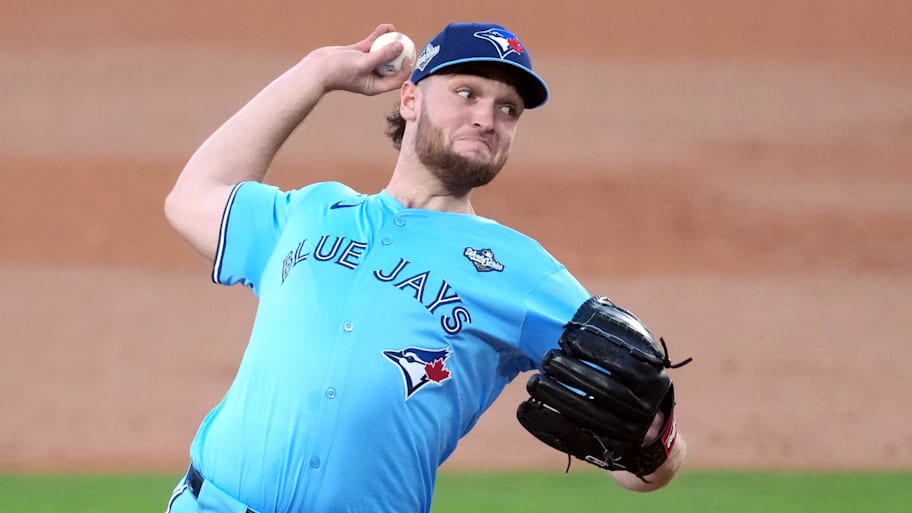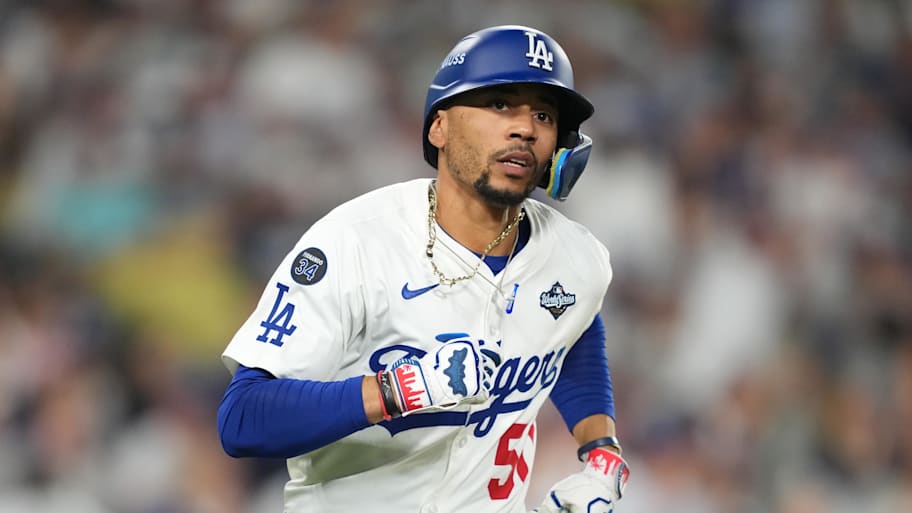
LOS ANGELES — In a star-studded World Series, attended by royalty and played by baseball royalty, with a pair of rosters that combine to cost $876 million, in which the faces of two or three nations compete nightly for camera time, it was a young man who basically lives out of his Toyota Tundra who sent the Dodgers’ season to the brink.
The Blue Jays’ Trey Yesavage baffled the Los Angeles lineup in a 6–1 victory in Game 5 of the World Series to send his team back to Toronto one win from glory. He produced seven sparkling, 12-strikeout innings; allowed one run; and broke the hearts of the 52,175 in attendance who by the end were all but silent despite the exhortations of the preposterously loud speaker system. As he trotted from the bullpen to the mound to begin the game, he thought about how he had opened his season pitching in front of 327 people against the Jupiter Hammerheads. He hoped to send this crowd home upset.
“It’s a crazy world,” Yesavage said. “Hollywood couldn’t have made it this good.”
It would be hard to cast the first return to the World Series by a defending champion since the Phillies did it in 2009 as a failure, but the level of talent on this roster—and the money spent on it—means anything short of a dynasty will be a disappointment.
Blake Snell falls short
The Dodgers felt well equipped to leave Los Angeles with a series lead. Game 5 marked a rematch of Game 1, between the Dodgers’ Blake Snell, a two-time Cy Young winner pitching in his 10th season and second World Series, and the Blue Jays’ Trey Yesavage, a 22-year-old who began the year at Single A and has three regular-season major league appearances to his name. Yesavage took the first matchup, going only four innings but allowing only two runs; Snell, who had opened the National League Championship Series against the Brewers with eight one-hit, scoreless innings, allowed five runs in five frames and took the loss.
Recently, his agent, Scott Boras, sent him a study he’d commissioned about October at Dodger Stadium. Boras’s team found that hitters struggle to see breaking balls during the first four or so innings of the 5 p.m. postseason starts.
Perhaps Snell should have studied it more closely: His first pitch was a 97-mph fastball that Davis Schneider whacked over the left field wall.
ONE PITCH ONE RUN FOR THE BLUE JAYS WOW! pic.twitter.com/fgCYBVTs66
— FOX Sports: MLB (@MLBONFOX) October 30, 2025
Two pitches later, Snell threw Vladimir Guerrero Jr. a 96-mph fastball, and Guerrero did the same thing.
PLAKATA! THE @BLUEJAYS GO BACK-TO-BACK TO START GAME 5!
— FOX Sports: MLB (@MLBONFOX) October 30, 2025
📺: #WorldSeries on FOX pic.twitter.com/kwF7XfN5Nm
It marked the first back-to-back leadoff home runs in World Series history, and the first time in this one that the Blue Jays scored first.
Dodgers’ offense has disappointed in October
In April or June, two runs would not have been insurmountable for the vaunted Dodgers’ offense, the best in the National League in most metrics. But the bats have largely gone cold in October.
The Dodgers had a .768 regular-season OPS; in the first four games of the World Series, that figure was .693. Only DH Shohei Ohtani and first baseman Freddie Freeman had an OPS over .800. L.A. was 5-for-29 with runners in scoring position.
So after running out the same lineup for most of the postseason, Roberts finally made a change Wednesday. He moved shortstop Mookie Betts from second to third in the batting order and Freeman from third to fourth, slotting catcher Will Smith in second. Roberts also swapped in outfielder Alex Call for Andy Pages in the nine hole.
Betts had not batted lower than second in the Dodgers’ order since September 2021, but he entered the night hitting .147 with one extra-base hit over his last eight games. With Pages going 4-for-October, Ohtani, leading off, did not really have anyone to drive in or anyone to drive him in.
Roberts, often expansive in his scouting reports on his own players, said simply, “I feel that that’s the best way to win the game tonight.”

Yesavage gave Dodgers a new look
Roberts’s tweaks were not enough. Yesavage is a difficult matchup in part because of his inexperience; he has the highest release point in the majors, at 7.1 feet in the air (compared to the average of 5.8 feet), and his split-fingered fastball, which he throws in the low 80s, resembles basically no one else’s. So the Dodgers were confident that they could take advantage of the familiarity of a second meeting. But Yesavage lacked feel for his splitter in Game 1 and threw it only 13% of the time; it was back to its devastating best in Game 5, so he was a new pitcher after all.
In fairness, nearly everything he does is new. The Blue Jays took Yesavage with the 20th overall pick in last year’s draft out of East Carolina University, and no one expected this meteoric rise from him. Toronto manager John Schneider vaguely remembered a “Hey, nice to meet you, kid. Welcome to the organization,” interaction in spring training; L.A. manager Dave Roberts hadn’t heard of the kid until he blanked the Yankees for 5 ⅓ innings in Game 2 of the ALDS. Yesavage was called up so late in the year that it did not occur to him to try to find an apartment; instead he stores most of his belongings in his truck (“It looks like a mobile home,” he said) and packs and unpacks a suitcase to stay in a hotel each time the Blue Jays change cities.
“This playoff paycheck is going to be nice whenever it hits,” Yesavage said.
Maybe the naivete helps, or maybe he’s just really good. In any case, he set down the first seven in order, including five straight strikeouts, before allowing a solo home run to Kiké Hernández in the third. Then Yesavage quickly went back to mowing them down, with 10 strikeouts and only two hits through five innings. Even as his pitch count rose and the third time through the order loomed, Blue Jays manager John Schneider, who has learned to manage more with his eyes than with his clipboard in the postseason, just kept sending him out there. In the sixth, Schneider turned to pitching coach Pete Walker and said, “I don’t think there’s anyone better in our bullpen right now.”
The kid rewarded him with absolute dominance. Yesavage’s 12 K, in the seventh, was the most by a rookie in World Series history.
NO ROOKIE IN #WORLDSERIES HISTORY HAS MORE STRIKEOUTS IN A SINGLE GAME THAN TREY YESAVAGE! pic.twitter.com/EPhVlbseQK
— Toronto Blue Jays (@BlueJays) October 30, 2025
“He’s just completely composed,” said righty Chris Bassitt. “The moment’s not too big for him, which is crazy for how young he is.” He added, “Some guys mentally are just built different, and the fact that he had the utmost confidence walking into this place—he’s pitched a lot at home, but coming into this place, it’s like, Damn. Wow.”
Yesavage simply beat the Dodgers on the mound, but the Dodgers often beat themselves in the field. Betts threw wide on a potential double-play ball in the third to cost Snell seven pitches. Teoscar Hernández cost more an inning later, when Daulton Varsho scorched a ball to right field. Hernández took a bad route, slid, came up short and watched helplessly as Varsho scampered to third. The next batter, Ernie Clement, flied to center to drive in the run. In the seventh, Addison Barger singled, took second on a wild pitch (Snell’s), took third on a second wild pitch (Snell’s again) and scored on yet another wild pitch (this one by righty Edgardo Henriquez). An inning later, the Dodgers added a fourth wild pitch, this one by lefty Anthony Banda; that one, too, advanced a runner who later scored.
“Giving up bases, it changes the lineup as far as who comes up, and it affects the game going forward,” said Roberts. “Things certainly get magnified in games like this, especially when you’re not swinging the bats.”
It was almost a relief when Teoscar Hernández struck out swinging to put the game out of its misery.
Dodgers have no more room for error
The Dodgers may carry a slight advantage into Game 6; their scheduled starter, Yoshinobu Yamamoto, is coming off two consecutive complete games, the first time someone has done that in the postseason in 25 years. On the other hand, the Blue Jays will be at home, they will need to win only one game and they will counter with Kevin Gausman, who matched Yamamoto through six last week before making two mistakes.
But Los Angeles has no margin for error. The team will fly to Canada late Wednesday, ahead of Thursday’s off-day and Friday’s game, knowing that another offensive performance like this will almost certainly end the season. Thanks in part to the kid who spent more time this season with the Dunedin Blue Jays than the Toronto Blue Jays, the Dodgers may only have two more nights in a hotel this year.
More World Series on Sports Illustrated
This article was originally published on www.si.com as Trey Yesavage Pens the Ultimate Underdog Story With World Series Game 5 Gem.







